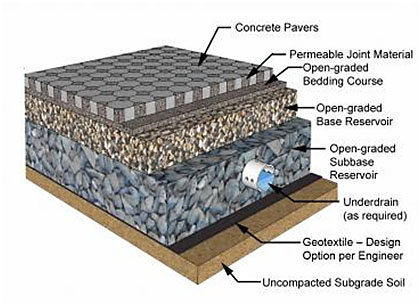Permeable Paving: An Eco-Friendly Option

Permeable paving, also known as porous or pervious paving, is a type of surface treatment designed to allow water to pass through it, thereby reducing stormwater runoff and promoting natural groundwater recharge. Unlike traditional impervious surfaces such as concrete and asphalt, permeable paving is constructed using materials like permeable concrete, porous asphalt, and interlocking pavers filled with gravel or grass. These materials have void spaces that enable water to infiltrate through the surface and into the ground below. This not only helps in managing stormwater but also mitigates flooding, filters pollutants, reduces the urban heat island effect, and supports sustainable urban development.
Benefits of Permeable Paving
- Stormwater Management
Permeable paving allows water to infiltrate through the surface, significantly reducing the volume of stormwater runoff. This process helps in preventing flooding in urban areas by allowing water to soak into the ground. Additionally, the infiltrated water replenishes groundwater supplies, thereby supporting local aquifers and maintaining the natural water cycle.
- Water Quality Improvement
The layers in permeable paving systems act as natural filters, removing pollutants from the water as it percolates through. This filtration process improves the quality of water that eventually reaches groundwater sources. Moreover, by managing stormwater at its source, permeable paving helps to prevent erosion in nearby water bodies, thus protecting local ecosystems.
- Environmental Sustainability
Permeable surfaces often remain cooler than traditional pavements, which helps to mitigate the urban heat island effect. They integrate well with other green infrastructure solutions, such as rain gardens and bioswales, supporting broader environmental sustainability initiatives. Additionally, permeable paving can support plant growth and create habitats for local wildlife, promoting biodiversity in urban areas.
- Economic Benefits
Permeable paving can lead to lower infrastructure costs by reducing the need for extensive stormwater management systems, such as pipes and detention basins. It can also increase property value by enhancing the aesthetic appeal and functionality of the area. Moreover, permeable paving surfaces are often durable and require less maintenance than traditional pavements, leading to long-term cost savings.
Applications of Permeable Paving
- Residential Areas
Homeowners can use permeable materials for driveways and walkways to manage runoff and reduce puddles. Additionally, permeable paving is an excellent choice for creating sustainable patios and decks, providing a functional and eco-friendly outdoor living space.
- Commercial and Public Spaces
Large-scale permeable parking lots help manage stormwater in commercial areas, reducing the risk of flooding and improving water quality. Sidewalks and plazas can also benefit from permeable paving, enhancing the aesthetic appeal and functionality of urban public spaces while promoting sustainability.
- Roadways and Streets
Permeable paving is suitable for low-traffic roads, such as residential streets, where it can effectively manage stormwater and reduce runoff. It is also an excellent option for bike lanes, providing a safer and more sustainable surface for cyclists.
- Parks and Recreational Areas
In parks and recreational areas, permeable paving can be used for pathways and trails, maintaining the natural aesthetics while providing durable walking and biking paths. Sports fields constructed with permeable materials benefit from improved drainage and usability, making them more resilient to weather conditions.
- Industrial Applications
In industrial settings, permeable paving can be used in areas where water management is crucial, such as loading docks and industrial yards. This application helps manage stormwater runoff and reduce the impact on the surrounding environment.
Types of Permeable Paving Materials
- Permeable Concrete: Concrete with high porosity that allows water to pass through.
- Porous Asphalt: Similar to traditional asphalt but with more void spaces for water infiltration.
- Permeable Pavers: Interlocking concrete or plastic grids filled with gravel or grass.
- Grass Pavers: Grids filled with soil and grass, allowing for a green and permeable surface.
Permeable paving is an eco-friendly and versatile solution that offers numerous environmental, economic, and aesthetic benefits. By integrating permeable paving into various applications, communities can enhance sustainability, manage stormwater effectively, and improve overall urban livability.